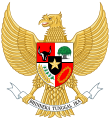
Back السياسة في إندونيسيا Arabic Política d'Indonesia AST İndoneziyanın dövlət quruluşu Azerbaijani Pulitik di Indonésia BEW Държавно устройство на Индонезия Bulgarian ইন্দোনেশিয়া#রাজনীতি Bengali/Bangla Politisches System Indonesiens German Política de Indonesia Spanish سیاست در اندونزی Persian Politique en Indonésie French
Politics of Indonesia Politik Indonesia | |
|---|---|
 | |
| Polity type | Unitary presidential constitutional republic |
| Constitution | Constitution of Indonesia |
| Legislative branch | |
| Name | People's Consultative Assembly |
| Type | Bicameral |
| Meeting place | Parliamentary Complex |
| Presiding officer | Ahmad Muzani, Speaker |
| Upper house | |
| Name | Regional Representative Council |
| Presiding officer | Sultan Bachtiar Najamudin, Speaker |
| Lower house | |
| Name | House of Representatives |
| Presiding officer | Puan Maharani, Speaker |
| Executive branch | |
| Head of state and government | |
| Title | President of Indonesia |
| Currently | Prabowo Subianto |
| Appointer | Direct popular vote |
| Cabinet | |
| Name | Cabinet of Indonesia |
| Leader | President |
| Deputy leader | Vice President |
| Headquarters | Merdeka Palace |
| Judicial branch | |
| Name | Judiciary of Indonesia |
| Supreme Court | |
| Chief judge | Sunarto |
| Constitutional Court | |
| Chief judge | Suhartoyo |
| This article is part of a series on the |
| Politics of Indonesia |
|---|
 |
The politics of Indonesia take place in the framework of a presidential representative democratic republic whereby the President of Indonesia is both head of state and head of government and of a multi-party system. Executive power is exercised by the government. Legislative power is vested in both the government and the bicameral People's Consultative Assembly. The judiciary is independent of the executive and the legislature.[1]
The 1945 constitution provided for a limited separation of executive, legislative and judicial power. The governmental system has been described as "presidential with parliamentary characteristics".[1] Indonesia was democratic upon independence, but became authoritarian in 1957 under Sukarno.[2] It remained authoritarian under his successor Suharto until the Indonesian riots of May 1998 and the resignation of President Suharto, which led to the restoration of democracy in Indonesia.
The Economist Intelligence Unit rated Indonesia a "flawed democracy" in 2023.[3] According to the V-Dem Democracy indices Indonesia was 2023 the 11th most electoral democratic country in Asia.[4] Indonesia's political parties have been characterized as cartel parties with extensive power-sharing among parties and limited accountability to voters.[5][6][7]
According to the American think tank Freedom House, Indonesia fails to meet many of the civil requirements for a consolidated, or maximalist, democracy. The court system often has many instances of corruption, and there is no due process many in civil and criminal matters.[8]
- ^ a b King, Blair. A Inside Indonesia:Constitutional tinkering: The search for consensus is taking time Archived 29 October 2009 at the Wayback Machine access date 23 May 2009
- ^ Hindley, Donald (1962). "President Sukarno and the Communists: The Politics of Domestication". American Political Science Review. 56 (4): 915–926. doi:10.2307/1952793. ISSN 1537-5943. JSTOR 1952793.
- ^ Democracy Index 2023: Age of Conflict (PDF). Economist Intelligence Unit (Report). 2024. Archived (PDF) from the original on 9 June 2024. Retrieved 22 July 2024.
- ^ V-Dem Institute (2023). "The V-Dem Dataset". Archived from the original on 8 December 2022. Retrieved 14 October 2023.
- ^ Slater, Dan (2018). "Party Cartelization, Indonesian-Style: Presidential Powersharing and the Contingency of Democratic Opposition". Journal of East Asian Studies. 18 (1): 23–46. doi:10.1017/jea.2017.26. ISSN 1598-2408.
- ^ Slater, Dan (2024). "Indonesia's High-Stakes Handover". Journal of Democracy. 35 (2): 40–51. doi:10.1353/jod.2024.a922832. ISSN 1086-3214. Archived from the original on 6 April 2024. Retrieved 2 April 2024.
The cardinal fact of Indonesian elite politics is that party competition during elections is invariably followed by party cartelization after elections.4 Since the exact contours and boundaries of the ruling coalition are always subject to intense and protracted negotiation, it is never certain who will be in government and who will be out. What is certain is that it is Indonesian elites, not Indonesian voters, who decide what the government will look like and who, if anybody, will serve as opposition.
- ^ McCargo, Duncan; Wadipalapa, Rendy (2024). "Southeast Asia's Toxic Alliances". Journal of Democracy. 35 (3): 115–130. doi:10.1353/jod.2024.a930431. ISSN 1086-3214.
- ^ "Indonesia: Freedom in the World 2022 Country Report". Freedom House. Archived from the original on 4 March 2023. Retrieved 4 March 2023.